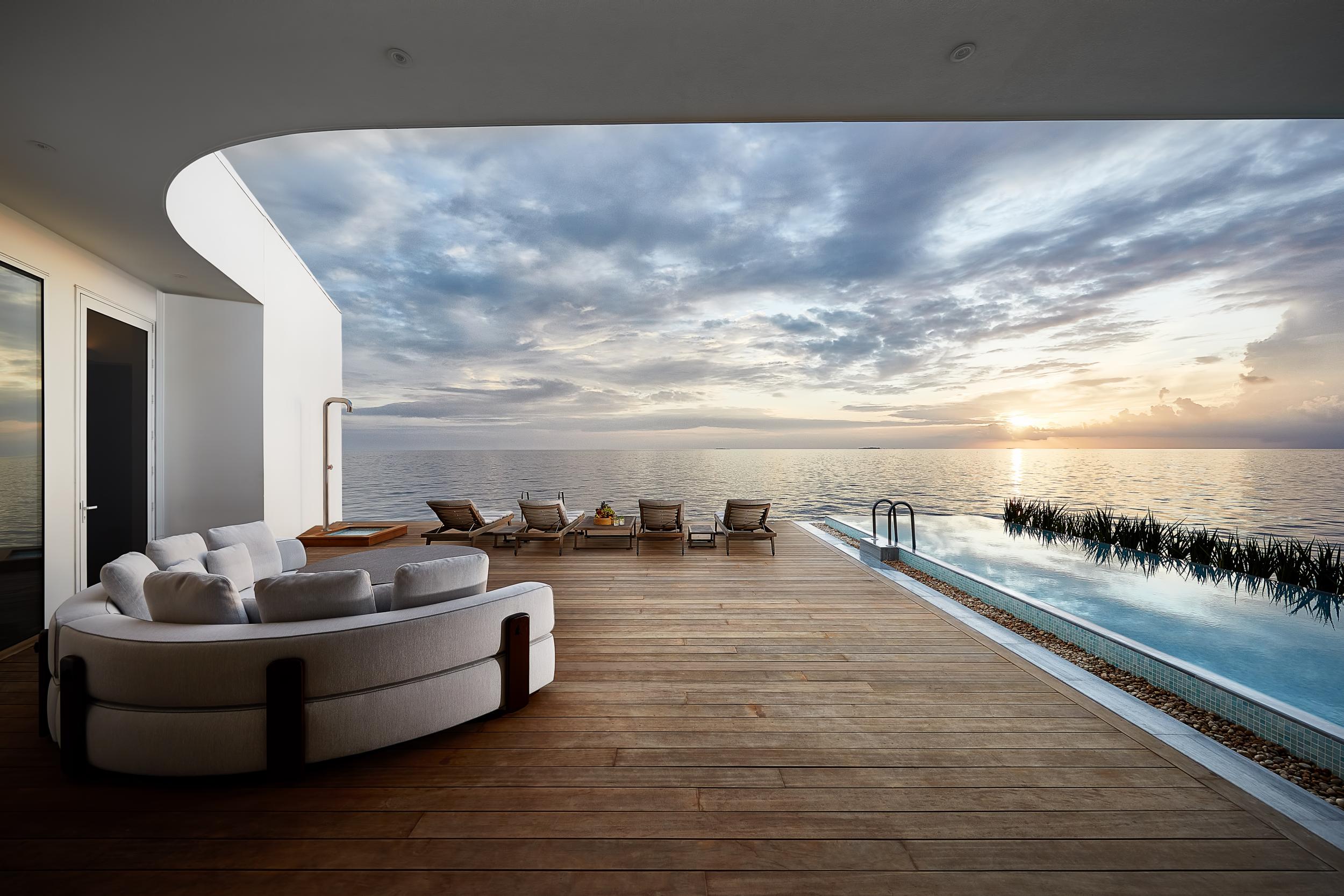What it's like to sleep five metres underwater
Melissa Locker was one of the first to spend a night at The Muraka, the just-opened underwater residence in the Maldives
Think of your dream holiday. Is it you, sitting in a stilted Maldivian villa, enjoying the sunset?
That was the dream, although that is about to change. Now the ultimate bucket list hotel stay won’t be overwater, but rather five metres under it.
Conrad Maldives Rangali Island has just opened The Muraka, an underwater residence where guests can sleep with the fish in a luxury bedroom kitted out with thousand-thread-count bed sheets, Aesop soap and near panoramic views of the surrounding coral.
I slept there, and I’m here to tell you it’s incredible. And it should be: it costs around $50,000 a night.
For that price, The Muraka is not just a hotel room, but an entire experience; from a private jet to on-site staff and a heaving menu of activities and adventures.
I was met at the main Conrad resort by my personal butler – a 27-year-old Frenchman who hates wine but will drink champagne when forced to by bossy guests – who was at my beck-and-call for the duration of my stay at The Muraka. He ushered me to a dock where my private boat idled, waiting to whisk me away to my temporary home. Only as you approach on a speedboat or via the very long bridge that connects it to the mainland – the two arrival options until the private seaplane dock is finished – does the residence come into focus.

The Muraka takes its name from the Maldivian word for coral. If Frank Lloyd Wright designed a reef, it would look like The Muraka: all sleek lines and white angles. The boat pulled up and I was ushered out of the sun where I was greeted with a glass of champagne and the rest of the staff who would be catering to my every whim for the duration of the stay. (More champagne? Midnight chips? Massage while eating chips and sipping champagne? Everything is on demand for guests at The Muraka.)
The upper level of The Muraka looks like your average stunning boutique hotel, albeit with a superior view thanks to floor-to-ceiling windows, which look out over the turquoise Indian Ocean. There’s a deck with an infinity pool; multiple patios for sunset watching and sunrise yoga; a bar and a formal dining room for entertaining; an all-glass master bedroom suite; a Japanese toilet which lifts its lid when you enter the room; and plenty of space for your staff to bunk down next door. This is all nice, if expected – but it’s what lies five metres below that makes The Muraka truly exceptional.

Step into a lift tucked into a discreet corner of the living room, descend one flight, and the doors open to a floor-to-ceiling window. It doesn’t quite register what you’re looking at until the fish start to dart past.
Round a corner and you’re in an aquarium, suffused with a blue-green light. To the right, is a walk-in wardrobe with a glass wall for fish peeping. To the left is the bathroom with glass walls so tropical fish can watch you brush your teeth.
The centrepiece is the bedroom, in which a curved glass ceiling gives 270-ish-degree views of the water. It was slightly overwhelming: thank goodness my butler was on hand with a shot of espresso, a glass of champagne and the wifi password, because the place needed to be posted on Instagram immediately. After posting enough pictures to make my friends (and enemies) jealous, I settled into a comfy chair to watch the underwater drama while the butler gracefully ignored my quiet humming of “Under the Sea”.

After a dinner on the back deck, prepared by the chef, I bedded down with the fish. There’s a curtain that can be drawn over the bedroom’s curved roof, but I wanted the experience of waking up underwater. At night, the ocean is dark, rendering the fish invisible – but not silent. The night was filled with mysterious clicking noises coming from the roof, strange popping sounds and a dull roar. (When I asked the resident marine biologist the next day, she explained that the parrotfish liked to nibble on the algae that grows on the building’s seams, clacking on the glass with their giant teeth.)
Waking up underwater was as surreal as falling asleep under it. The sunlight slowly filtered through the water, filling the bedroom with a dreamy blue light. Cracking open an eye, I made direct eye contact with a puffer fish. After lounging in bed, watching angel fish and the alluringly named oriental sweetlips darting around, I headed upstairs where the chef had created a smoothie bowl, green detox juice, and several cups of coffee.
As a guest of The Muraka, I could have enjoyed a champagne brunch at the resort’s undersea restaurant, Ithaa, which was the first of its kind when it opened in 2005. But instead, I descended back to the depths of The Muraka to let the magic last a little longer.
Details
The Muraka at Conrad Maldives Rangali Island costs from around $50,000 a night.
British Airways flies to Male from London from £831pp.
Join our commenting forum
Join thought-provoking conversations, follow other Independent readers and see their replies
Comments
Bookmark popover
Removed from bookmarks